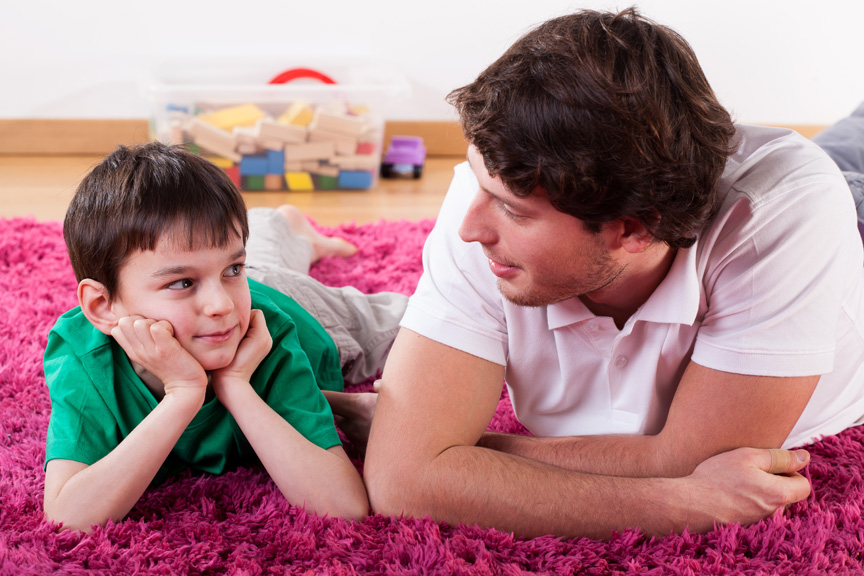- Parenting
How to make adoption discussion easier, natural for your child

In this article, you’ll find answers to questions like:
1. When should I start talking to my child?
2. Why do words matter?
3. What should I expect in the teen years?
Are you torn about how to talk to your son or daughter about their adoption? Do you wonder which age is best for that first conversation, what kind of tone to take and even what words or phrases to use?
The language used to describe adoption has changed. For example, rather than say a child was “put up for adoption,” specialists are saying the birth parents “made an adoption plan” or “placed the child for adoption.”
1. WHEN SHOULD I START TALKING TO MY CHILD?
The best approach to talking about your child’s adoption is to start early, says Gina Fazio, director of clinical services for Place of Hope in Palm Beach County, and Robert C. Lamarche, executive director and attorney for Advocates for Children and Families, based in North Miami Beach.
When children are young, honest and open conversations about their origin stories — how they became part of the family — builds positive feelings about adoption.
Fazio, who is a permanent guardian of three children from Place of Hope, suggests creating a baby book, including the birth parents and photos showing when they joined your family.
“When little kids hear about their adoption from the beginning, they don’t know it as something negative. If they find out it’s a secret, then it can impact their trust,” Fazio says. “I suggest to adoptive parents that they share with their child as soon as they are old enough to understand. I think it takes the stigma away from adoption, but it doesn’t take away from the relationship.”
Lamarche, who adopted two children, recommends using books on all kinds of families to introduce the concept to little ones, such as “Tell Me Again About the Night I was Born,” by Jamie Lee Curtis and Laura Cornell, and “And Tango Makes 3” by Peter Parnell and Justin Richardson.
“It’s appropriate to introduce the topic of adoption as early as you start reading to your child,” he says. “Just as you would read your child a book about trains to help them understand what they are, you can read a book about adoption, so they can apply the idea to their family.”
2. WHY DO WORDS MATTER?
Word choice can give negative or positive connotation that can influence a child’s self-esteem, Fazio says. So it’s best to be mindful of the words you choose.
“You wouldn’t introduce your child as ‘my biological daughter,’ so why would you say, ‘my adopted daughter,’ ” she says. “The way you refer to your child will determine how your family and friends react to them.”
Lamarche advises parents to check out online resources, such as “Respectful Ways to Talk about Adoption” from the American Academy of Pediatrics.
Local support groups for adoptive parents are also available via ChildNet.
3. WHAT SHOULD I EXPECT IN THE TEEN YEARS?
Talking about adoption is a lifetime conversation, Lamarche says. As children get older, more questions may arise.
“Just because a little person knows they are adopted doesn’t mean they won’t have more questions at 7, 9 or 16 years old,” he says. “Adoptive parents need to be prepared for the conversations to evolve over time and for their teenagers to possibly want to know more about their birth parents. It’s a very normal quest to understand themselves. I would hope the child would feel safe starting any conversation with their parents.”
SOURCES:
• Gina Fazio, director of clinical services, Place of Hope
• Robert C. Lamarche, executive director and attorney, Advocates for Children and Families
You May Also Like
-
- Parenting
Considering private adoption? Here's where to start . . .
Choosing private adoption means following several steps, such as being matched with a birth mother, submitting to a home study and taking a parenting class. The time and expense of …
Read More -
- Other
- Parenting
Interested in public adoption? Learn the steps, resources
Children who are available for adoption through the state child welfare system have been removed from their parents for a number of reasons, such as abuse, neglect or abandonment. …
Read More -
- Behavior
- Health
- Parenting
Six tips for fostering healthy conversation on tough topics
Sometimes it can be hard to know where to start when having a difficult or awkward discussion with your kids. These tips revolving around a designated safe space may help. …
Read More
Related resources
-
- Other
- Parenting
- Safety
ChildNet
Adoption services
561-352-2501 Website Email -
- Education
- Other
- Safety
Legal Aid Society of Palm Beach County
Children’s Advocacy — free legal services for the disadvantaged related to health care, education, foster care, juvenile court issues and relative caregivers
561-655-8944 Website
